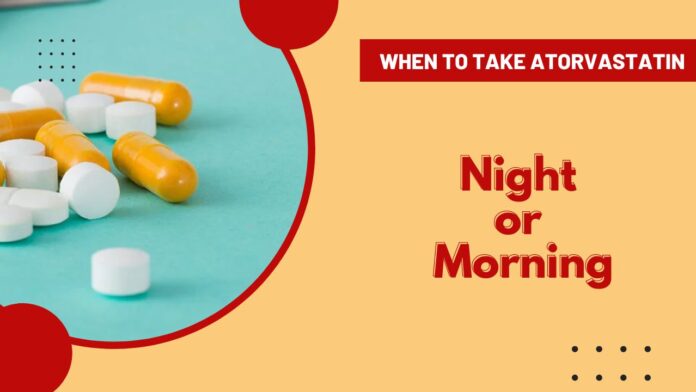Atorvastatin is a medication that falls under the category of statins, which are a class of drugs commonly used to lower cholesterol levels in the bloodstream. Cholesterol is a type of fat that is essential for various bodily functions, but when levels become excessively high, it can contribute to the development of cardiovascular diseases such as heart attacks and strokes. Atorvastatin is prescribed to help reduce these elevated cholesterol levels and mitigate the associated health risks.
Here’s how atorvastatin functions to lower cholesterol levels:
- Inhibition of HMG-CoA Reductase: Cholesterol is produced in the liver through a series of biochemical reactions, and one of the key enzymes involved in this process is called HMG-CoA reductase. Atorvastatin works by inhibiting the activity of this enzyme. By doing so, it decreases the liver’s ability to produce cholesterol.
- Reducing LDL Cholesterol: Low-density lipoprotein (LDL) cholesterol is often referred to as “bad” cholesterol because high levels of LDL cholesterol are associated with an increased risk of atherosclerosis. Atherosclerosis occurs when fatty deposits accumulate on the inner walls of arteries, narrowing them and impeding blood flow. Atorvastatin reduces LDL cholesterol levels by inhibiting the production of cholesterol in the liver. This leads to a decrease in the amount of LDL cholesterol circulating in the bloodstream.
- Increasing HDL Cholesterol: High-density lipoprotein (HDL) cholesterol is often referred to as “good” cholesterol because it helps transport excess cholesterol from the bloodstream to the liver, where it can be processed and removed from the body. Atorvastatin can modestly increase HDL cholesterol levels, which is beneficial for overall cardiovascular health.
- Triglyceride Reduction: Triglycerides are another type of fat found in the blood. Elevated triglyceride levels are also linked to an increased risk of cardiovascular disease. Atorvastatin can help lower triglyceride levels by decreasing the liver’s production of triglycerides.
- Stabilization of Plaques: In addition to its cholesterol-lowering effects, atorvastatin has been shown to have other cardiovascular benefits. It can help stabilize atherosclerotic plaques, reducing the likelihood of plaque rupture and the subsequent formation of blood clots that can lead to heart attacks and strokes.
Relevance to Medication Timing: Atorvastatin
Atorvastatin, a commonly prescribed statin medication for lowering cholesterol, has been a subject of debate regarding whether it should be taken in the morning or at night. This debate is rooted in the understanding of the body’s circadian rhythms and how they might affect the medication’s effectiveness.
Morning Dosage Argument:
Proponents of taking atorvastatin in the morning argue that it aligns with the body’s natural circadian rhythm. Cholesterol production in the liver tends to be higher at night, and taking atorvastatin in the morning might inhibit the enzyme HMG-CoA reductase when its activity is increasing, leading to a greater reduction in cholesterol production throughout the day.
Nighttime Dosage Argument:
Those advocating for taking atorvastatin at night emphasize that the body’s metabolism, absorption, and elimination of drugs can be influenced by circadian rhythms. They believe that taking the medication before sleep might capitalize on the body’s natural processes, potentially leading to better absorption and utilization of the drug.
Scientific Studies and Debate:
Research has been conducted to investigate the effects of atorvastatin timing on its efficacy and safety. Some studies suggest that taking atorvastatin at night could result in better lipid-lowering effects and overall cardiovascular risk reduction compared to morning dosing. Other studies have found minimal differences between morning and nighttime dosing.
It’s important to note that the debate over atorvastatin timing is not yet definitively settled, and individual responses can vary based on factors such as genetics, other medications being taken, and specific health conditions. As a result, healthcare providers may consider the patient’s unique situation when recommending the optimal timing for atorvastatin administration.
Morning Atorvastatin Intake: Pros and Cons:
Taking atorvastatin in the morning has both potential benefits and drawbacks. Here are the pros and cons associated with morning intake of atorvastatin:
Pros:
- Alignment with Circadian Rhythms: Some proponents argue that taking atorvastatin in the morning aligns with the body’s natural circadian rhythm. Cholesterol production tends to be higher at night, and taking the medication in the morning might inhibit cholesterol production during the day when it’s naturally higher.
- Adherence: Taking medications in the morning can become part of a daily routine, making it easier to remember and adhere to the prescribed regimen.
- Daytime Effects: Atorvastatin’s lipid-lowering effects may be particularly important during the day when individuals are typically more active and engaged in various activities. Lowering cholesterol during this time might provide benefits in terms of reducing cardiovascular risk throughout the day.
Cons:
- Statins’ Half-Life: Atorvastatin has a relatively short half-life, meaning that its effects wear off after a certain period. Taking it in the morning might lead to lower statin levels in the body during the night, which is when cholesterol production is naturally higher. This could potentially limit the medication’s effectiveness during the nighttime peak of cholesterol synthesis.
- Meal Timing and Absorption: Some studies suggest that taking atorvastatin with food might improve its absorption, and individuals might not always have a consistent meal schedule in the morning.
- Medication Interactions: Depending on the other medications a person takes, there could be interactions that impact the timing of atorvastatin intake. These interactions might affect absorption, metabolism, or the potential for side effects.
- Individual Variability: Different individuals may metabolize medications differently. For some, the morning might be a less optimal time for medication absorption and efficacy.
Nighttime Atorvastatin Intake: Pros and Cons:
Taking atorvastatin at night also has its own set of potential benefits and drawbacks. Here are the pros and cons associated with nighttime intake of atorvastatin:
Pros:
- Circadian Rhythms and Cholesterol Production: Proponents of nighttime intake argue that taking atorvastatin at night could target the body’s natural peak of cholesterol production, which tends to occur during the overnight hours. Inhibiting cholesterol production during this period might lead to more effective cholesterol reduction.
- Stable Medication Levels: Taking atorvastatin at night might help maintain more consistent medication levels in the body during the hours when cholesterol synthesis is most active. This could potentially enhance the medication’s effectiveness.
- Compliance and Routine: For some individuals, taking medication before bed can become part of their nighttime routine, making it easier to remember and adhere to the prescribed regimen.
Cons:
- Meal Timing: Taking atorvastatin at night might require consideration of meal timing. Some individuals might not have a regular meal schedule close to bedtime, which could potentially affect medication absorption.
- Adherence: While some people find it convenient to take medication at night, others might forget or experience disruptions in their nighttime routine, leading to missed doses.
- Interactions and Lifestyle: Depending on an individual’s lifestyle, nighttime activities, and other medications being taken, there might be interactions or scheduling challenges that affect the suitability of nighttime dosing.
Factors Influencing the Decision:
Here are some important factors that might influence this choice:
- Circadian Rhythms and Cholesterol Peaks:
- Individuals with a strong preference for aligning medication with natural rhythms might opt for nighttime dosing to target the body’s peak cholesterol production during the night.
- Those who prefer a more daytime-focused approach might lean towards morning dosing to have an impact during active hours.
- Meal Timing and Absorption:
- Atorvastatin can be taken with or without food, but some people might prefer to take it with a meal to potentially enhance absorption. This could affect their choice of dosing time based on their meal schedules.
- Lifestyle and Routine:
- Individual routines and daily schedules can strongly influence the choice. Some might find it more convenient to take medication in the morning as part of their wake-up routine, while others might prefer to take it before bed.
- People who follow consistent bedtime routines might have an easier time incorporating nighttime dosing.
- Medication Regimen and Interactions:
- Individuals taking multiple medications need to consider potential interactions. If other medications are being taken at specific times, it might impact the choice of atorvastatin dosing time.
- Some medications have specific recommendations for timing due to interactions or effects on metabolism.
- Existing Health Conditions:
- Some health conditions, such as sleep disorders or shift work, might impact the body’s natural rhythms. This could influence the choice of dosing time to achieve the desired therapeutic effects.
- Individual Response and Tolerability:
- Individuals might find that they experience fewer side effects or better results at a specific dosing time. Paying attention to how the body responds can guide the decision.
- Healthcare Provider’s Recommendation:
- Ultimately, a healthcare provider’s guidance should play a significant role in the decision. They can assess a person’s medical history, overall health, and medication regimen to recommend the most suitable dosing time.
- Cardiovascular Risk and Specific Goals:
- Depending on a person’s cardiovascular risk factors and treatment goals, their healthcare provider might suggest a dosing time that optimally supports those objectives.
- Flexibility and Adaptability:
- Some individuals might opt for a trial period of morning dosing and then switch to nighttime dosing (or vice versa) if they feel that the initial choice isn’t delivering the desired results or comfort.
Expert Insights:
Healthcare professionals, including doctors, pharmacists, and researchers, offer valuable insights on the optimal timing of atorvastatin intake. While opinions might vary, here are some common themes from their perspectives:
- Individualization: Experts emphasize that the choice of dosing time should be individualized. Factors such as the patient’s medical history, lifestyle, existing health conditions, and other medications play a significant role in determining the optimal timing.
- Circadian Rhythms: Many experts acknowledge the importance of circadian rhythms in drug metabolism and efficacy. They suggest that aligning medication with these rhythms might enhance therapeutic outcomes.
- Consistency: Healthcare professionals often recommend consistency in dosing time. Taking atorvastatin at the same time every day helps establish a routine and promotes adherence.
- Patient Preference: Patient preferences are crucial. Experts often advise patients to choose a dosing time that fits well with their daily routine and is likely to encourage consistent use.
Here’s why it’s crucial to reach out to your healthcare provider for personalized recommendations:
- Expert Guidance: Healthcare professionals, such as doctors and pharmacists, possess the expertise and knowledge needed to guide you through complex medical decisions. They can provide you with accurate information and personalized insights based on your medical history and current health status.
- Individual Variability: Every individual is unique, and factors such as your medical conditions, current medications, lifestyle, and preferences all play a role in determining the most suitable dosing time for atorvastatin. A healthcare provider can tailor their advice to your specific needs.
- Holistic Assessment: Healthcare providers take a holistic approach to your health. They consider your overall well-being, other health conditions you might have, potential interactions with other medications, and any relevant lifestyle factors.
- Monitoring and Adjustments: Regular communication with your healthcare provider allows you to monitor your response to atorvastatin and make necessary adjustments if needed. If you experience any side effects or changes in your health, they can guide you on how to manage them effectively.
- Evidence-Based Recommendations: Healthcare providers base their recommendations on the most current medical evidence and research findings. They can provide you with the latest insights that might not be readily available elsewhere.
- Ensuring Safety: Some medications, including atorvastatin, have potential interactions or contraindications that your healthcare provider can help you navigate. Their expertise ensures that you’re taking medications safely and effectively.
- Shared Decision-Making: By consulting your healthcare provider, you become an active participant in your healthcare decisions. You can discuss your preferences, concerns, and any questions you might have, enabling you to make choices that align with your goals.
In the quest for a healthier heart, the timing of when to take atorvastatin can make all the difference. Whether it’s the tranquility of night or the vibrancy of morning, what truly matters is your commitment to better health. So, choose the moment that aligns best with your lifestyle, and let atorvastatin work its magic, ensuring your heart’s symphony plays on for years to come.
FAQ
Q1: What is the recommended dosage range for atorvastatin?
Ans: The usual dose for adults is between 10mg and 80mg a day.
Q2: Why are some statins recommended to be taken at bedtime?
Ans: Taking statins at bedtime targets the peak time of cholesterol production in the body.
Q3: What is the starting dose of atorvastatin for children?
Ans: The usual starting dose for children is 10mg once a day, which may be increased if needed.







